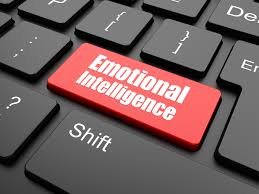Emotional Intelligence: Why It's so Important to Use It Daily


Written and verified by the psychologist Gema Sánchez Cuevas
Emotional intelligence is much more than just a bunch of approaches and strategies with the function of better identifying and managing our emotions. We’re really talking about the acquisition of an authentic emotional awareness you can use to build more solid and respectful relationships.
Also, it is a powerful way to see ourselves as more secure, successful, productive and happy.
We’ve all read about it. We’ve all heard about emotional intelligence at some point, be it at school, college, or at work. And lot of people recognize the name of psychologist Daniel Goleman.
“The key to achieving a high collective intelligence quotient is social harmony.”
-Daniel Goleman-
But actually, a long time before Goleman published his well-known book “Emotional Intelligence” in 1995, “emotional intelligence” had already debuted in 1964 in the scientific world at the hand of Michael Beldoch.
Michael spoke about communication and emotional sensitivity, of their implications and the way they determine our relationships and personality. Since then, the topic has made significant advances, giving way to different approaches and criticism.
Many experts don’t see any scientific rigor in it. They don’t accept the idea that emotional intelligence is “another” type of intelligence.
Instead, they view it as just another domain of intelligence itself, a skill at best. However, this psychological, social and motivational perspective has had an undeniable impact on our lives. Regardless of any holes that may or may not exist in Daniel Goleman’s theory.
Emotional intelligence improves our quality of life, our relationships, our self-perception, and even our performance at work. We’d even say that it’s an approach that should have input into the school curriculum. With it, we could raise more competent, secure, and happy children.
This emotional awareness is the key to improving our personal and social lives. We’ll explain why below.
Emotional intelligence is the key to a more satisfying life
Since childhood, many of us are taught emotional restraint. Without even knowing it, our parents and teachers more or less told us to keep things in. Saying things like, “Don’t cry, you’re too old for that”, “if you’re angry, hold it in” or the too-common “You make a big deal out of everything.”
Meager sensitivity to the emotional world, both our own and those of others, affects situations we’re in every single day. Within the family environment, there is still encouragement (sometimes serious) to not express our feelings.
But we can also see it in the workplace, where hierarchical structures continue to dominate. They’re hindered by leaders focused on getting things done right away, creating an oppressive and stressful work environment.
Dr. Goleman reminds us that emotional intelligence is vital in any relationship. Also, it has an essential objective: to offer us a more satisfying life. Read on to find out how to do it…
Why are emotionally intelligent people happier beings?
Let’s imagine for a second that emotional intelligence is like an antenna. An antenna with double feedback: internal and external. Thanks to this antenna, we can get to know ourselves better. We can also better understand our emotions and the emotions of others.
- Thanks to emotional intelligence we have a greater awareness of ourselves.
- We can also better manage our feelings.
- We develop greater empathy, both emotionally and cognitively.
- Plus, we develop a greater commitment to ourselves.
- We become more socially conscious.
“Looking someone directly in the eyes opens the door to empathy.”
-Daniel Goleman-
The paradigm of the workplace is changing. Developments like the ”gig economy” or the automation of many kinds of jobs leads some experts in this field to warn us about one very concrete thing. In the future, technical knowledge will not be as valuable. Instead, personal skills will be prized.
And so we can conclude that the key parts of an automated economy are skills like creativity, critical thinking, wit, and emotional intelligence. What does this mean? Workers would be smart to invest in areas that until now were often overlooked, such as emotional intelligence.

With emotional intelligence now being applied in the workplace, we suggest working on the following skills:
Self-awareness
- Emotional awareness: knowing how to recognize our own emotions and those of the people around us at all times.
- Emotional self-evaluation: knowing how to recognize our strengths and limitations.
- Self-confidence.
Self-regulation
- Self-control: the ability to remain in control in critical situations.
- Reliability: the importance of being honest and having integrity.
- Adaptability: the flexibility required to accept change.
- Innovation: the importance of accepting and promoting new ideas and approaches.
Motivation
- Achieving excellence by being oriented towards success.
- Being committed to the objectives of the organization.
- Having initiative and hope.
- Being optimistic and persistent.

Emotional intelligence as the “fuel” for raising children
Emotional intelligence is the key that opens the door to better relationships between children and their families and peers. It also can give them a more balanced perspective on life and a better chance of reaching their potential in school.
At the end of the day, knowing how to manage and understand our emotional world implies having an exceptional ability in our toolbox for learning, concentration, memory, controlling frustration, etc.
“The ability to express one’s own feelings constitutes a fundamental social skill.”
-Daniel Goleman-
On the other hand, the celebrated doctor of the 19th century, William Osler, gave an interesting warning. He said that children who make emotions their first language will make it the way they understand the world, communicate, ask for things, express themselves, interact, and explore. It’s how they will begin to develop their conscience.
Therefore, we need to be their guides, mediators, and translators. Because otherwise, feelings like frustration will limit them into adulthood.

Important points about teaching children about emotional intelligence
Emotional intelligence gives us the following points that should form part of a child’s everyday life. They are seeds of power and well-being we should plant in their hearts and minds.
- The identification of one’s own emotions. Children should learn at an early age to recognize and differentiate each one of their emotions, to label and name them.
- The management of one’s emotional state. As a youngster grows up and mature, they should learn the right skills to manage and control their emotions.
- Self-motivation. Another essential strategy in life is that of being able to channel one’s emotions towards a concrete objective, to motivate themselves.
- Empathy. The importance of recognizing the feelings of others is basic to emotional intelligence. As is tuning in to their verbal and nonverbal cues.
Lastly, we can’t forget to encourage interpersonal interaction in children. Specifically, how to do it well. This is where assertiveness and conflict resolution will make a big difference in their daily lives.
To conclude, emotional intelligence feeds and revitalizes our lives. Why? Because it impacts every single area of our lives. So let’s make it the wind in our sails in these complicated and ever-changing seas.
This text is provided for informational purposes only and does not replace consultation with a professional. If in doubt, consult your specialist.








